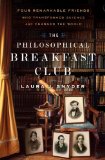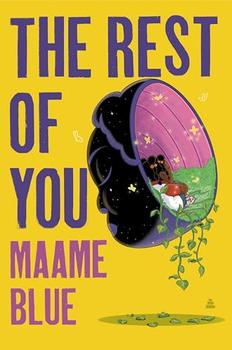Write your own review!
Therese X. (CALERA, AL)
A Great Visit with the Philosophical Breakfast Club
In June, 1833, the British Association for the Advancement of Science met at Cambridge University in England with members from all over the world. William Whewell of Lancashire addressed the gathering and spoke out especially for astronomy as the”Queen of the Sciences” promoting “facts and theory” calling those who pursued these as philosophers of which he was pleased to be a member. A
strident voice from the audience, none other than the Romantic poet, Coleridge, called Whewell and his “philosophers” to task for using a term to which they were not entitled. They were doing experiments,so to speak “getting their hands dirty”. As a “real metaphysician” Coleridge no longer permitted them this noble term. Whewell, with respect, genially accepted that the word having being taken by a loftier group, his men would by analogy with the "artist", form the word "scientist". Thus a new word, and profession, was coined which would catch on in decades to come.
Along with William Whewell, who came from humble beginnings, were three other “scientists”, Charles Babbage, John Herschel and Richard Jones, a burst of discoveries and knowledge would change the nineteenth century to such a degree that
these four very different men from varied backgrounds would remain friends for over fifty years as a result of their friendships formed at Cambridge. John Herschel, son of a famous astronomer father, was also a musician who composed symphonies and discovered a new planet! The first mechanical computer, invented by Charles Babbage, described ingeniously by the author lead the way to our modern computer technology. Richard Jones ,a Welshman with language skills studied law but
became a minister instead and contributed more to raise what was called “political
economy” to the more legitimate science of Economics. These and many other inventions surrounded the four inquiring minds who were part of the fifty year surge of progress of their time that parallels the past fifty years of our own modern age. This multi-biography is well-researched and many-layered but remains a
fascinating read beyond the discoveries hinted at in this mere review. Especially on a cold winter’s night, it’s a pleasure to be transported back to a time that was thought to be slower and quieter but was real and dynamic, a great bedside companion or group discussion book for those who like their history and science blended with zest and humanity.
Marsha S. (Nags Head, NC)
The Philosophical Breakfast Club
This extremely well-researched and written book goes beyond just an account of four extraordinary men and their accomplishments. It provides rich descriptions of their personal lives and the events that affected them emotionally and personally. Since I spent my career in the Information Technology industry, I was particularly fascinated by the sections dealing with Charles Babbage, but the lives of all are intertwined and each of their ideas influenced the others.
This is not a book for everyone, and I found that I had to read it in small sections. Like a great meal as opposed to fast food, sipped and savored.
Lesley F. (San Diego, CA)
Our history book club will definitely read this
I loved "The Philosophical Breakfast Club" and our social history book club will definitely be reading it! It is right up our alley both because of our interest in science of the modern era and the social connections the author draws.
Suri F. (Durham, NC)
Dense and Fascinating
This biography of a friendship among four men at the birth of modern science is fully researched and well written. The author is skilled at conveying the breadth of curiosity and engagement with the world that her subjects had. Their cumulative impact on Twenty-First Century life is astounding. While hardly a "page-turner," this book held my interest throughout. I have been hunting down others to share this book.
Susan R. (Dublin, NH)
Connecting the Dots
The Philosphic Breakfast Club helped shape the modern world in which science plays a starring role. The PBC was four Cambridge students in the early 1820's who had long Sunday breakfasts together and discussed the role and methods of "natural philosophy", as science was then called.
This is a group biography--warts and all--of the life-long friends and occasional rivals who coined the term "scientist" as a parallel of "artist" and were the movers and shakers of science as it devleoped into something we recognise today. They were polymaths and prolific writers.
This is a very good book that connects the dots for anyone interested in history or science or the history of science.
 Carol T. (Ankeny, Iowa)
Philosophical Breakfast Club
Carol T. (Ankeny, Iowa)
Philosophical Breakfast Club
Every page reminds me of yet another person who would really enjoy this book. I may have to buy a peck of them for gifts this next year!! Historian, scientist, mathematician, economist, inquiring mind....there's something here to satisfy nearly everyone's interest.
 Diane S. (Batavia, IL)
the Philosophical Breakfast Club
Diane S. (Batavia, IL)
the Philosophical Breakfast Club
Absolutely fascinating book about the birth of modern day scientists. Four friends who changed and invented everything from standardized testing to prison reform. They touched on so many different subjects. I just wish I could have attended some of their meetings. Very readable book that even non scientific people such as myself could relate to. I especially like that their personal lives were covered as well as their professional, made these brilliant men more human.
Mary Ellen (Canfield, OH)
The Philosophical Breakfast Club
The Philosophical Breakfast Club fulfills its promotional materials as a vivid portrait of four extraordinary men of 19th century science. The author has done extensive research into the details of their personal lives and scientific contributions, however occasionally these details were distracting. The four friends lived in an exciting time in scientific development and were instrumental in its progress. Laura Snyder gives us a renewed appreciation of this. If you have an interest in science, this is a must read.




